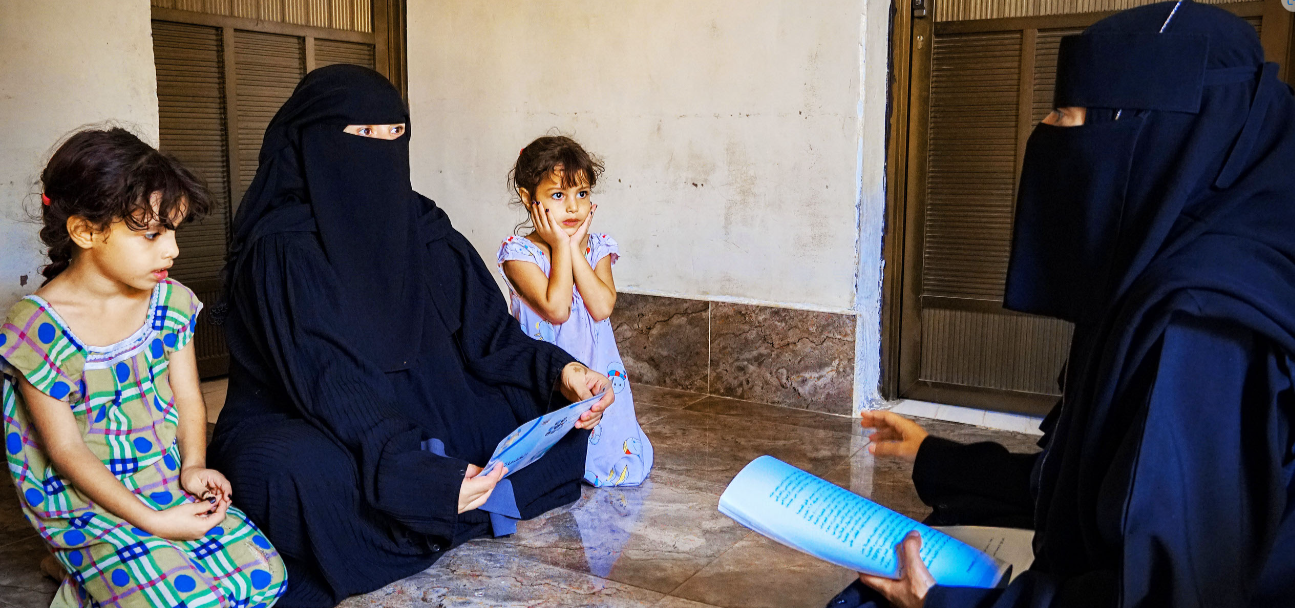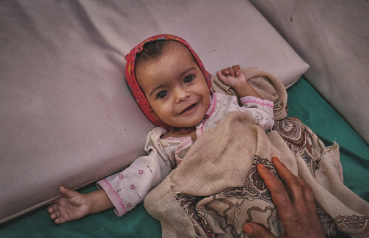Advancing health, rebuilding knowledge
Yemen’s heroes—the key to sustainable health outcomes
Multidimensional poverty, economic deterioration, illiteracy, and security, all remnants of a prolonged conflict, have coalesced into a forgotten crisis that has gripped millions of Yemenis, who continue to suffer from the highest rates of chronic malnutrition and poor health in the world.
“I’ve been a doctor at the therapeutic feeding centre since day one. I work with severe acute malnutrition cases referred from the hospital’s emergency department and from other hospitals in Aden and nearby governorates,” says Dr. Mohsen Saleh, a pediatric doctor at Al Sadaqah Hospital. The hospital admits an average of 60 SAM cases each month for immediate and urgent treatment.
WHO and USAID launch a new program to strengthen Yemen’s health system
ADEN, June 13, 2023 – Today, the U.S. Agency for International Development (USAID) and the World Health Organization (WHO) have jointly announced a new one-year, USD1.89 million program to more sustainably integrate COVID-19 vaccines and medical oxygen supplies into primary health care (PHC) services of Yemen.
The USAID-funded program will support the operations and running costs of eight oxygen plants, with a focus on delivering COVID-19 care to critically ill patients in the intensive care units (ICUs) of at least five referral hospitals. It will also enable WHO to train ICU personnel to better deliver life-saving care, and to strengthen local capacities to increase COVID19 vaccine uptake in vulnerable communities.
“We are transitioning our COVID-19 assistance from the earlier emergency response activities to a longer-term approach which integrates COVID-19 care into the overall health system,” said USAID Country Director for Yemen Kimberlee Bell. “In coordination with our Yemeni health partners, USAID has provided assistance in the past to improve local health systems. Today we are thrilled to announce these two new contributions which will improve lifesaving health services for the Yemeni people.”
“Thanks to our continuing partnership with USAID, WHO will be able to to scale up access to quality care by severely ill patients suffering from COVID-19 and other diseases in five referral hospitals across four governorates – Aden, Hadramout, and Marib and Taiz,” said Dr Arturo Pesigan, WHO Representative to Yemen. “Our partnership with USAID is also critical for transitioning WHO’s support to Yemen’s health systems from emergency relief to more sustainable programming.”
USAID funding to WHO during 2021 and 2022 supported the provision of medical oxygen for more than 1 million patients at 25 hospitals and other medical facilities. USAID, through WHO, also helped deploy vaccination teams who provided COVID-19 vaccination and outreach to remote communities.
Nine years of intensive conflict has left over two-thirds of Yemen’s population (21.6 million people) in present need of humanitarian assistance. Yemen’s deteriorating economy, high food insecurity and recurring disease outbreaks have all but collapsed the country’s health system. Currently, 46 percent of Yemen’s health facilities are non-functioning or partially functioning due to shortages of staff, funds, electricity, medicines, supplies, and equipment.
About WHO: Since 1948, The World Health Organization (WHO) has been the United Nations agency dedicated to advancing health for all, so that everyone, everywhere can attain the highest level of health. WHO leads global efforts to expand universal health coverage, direct and coordinate the world’s responses to health emergencies and connect nations, partners and people to promote health, keep the world safe and serve the vulnerable.
Media contacts
Christine Cool
External Relations/Resource Mobilization (EXR) Officer
World Health Organization (WHO), Yemen
e-mail:
Community health volunteers in Yemen: Empowering pregnant and nursing mothers to make best health choices

Across Yemen today, around 1.3 million pregnant or nursing mothers and 2.2 million children under age five require treatment for acute malnutrition. Health literacy is a critical tool for sustaining and saving their lives, especially when they are conflict-displaced and unable to access basic necessities like food, clean water, and primary health care.
The World Health Organization (WHO) in partnership with the King Salman Humanitarian Aid and Relief Centre (KSrelief) is supporting a refresher training for a network of 1,277 community health and nutrition volunteers to equip pregnant and breastfeeding women in 24 priority districts across 8 governorates with the right information to make the best health and nutrition choices they can for themselves and their infants, during and after their pregnancies.
Dhiya Saif, 28, is expecting her first child next month. She and her family were displaced by conflict five years ago, and now live in Aden, Yemen. The unaffordability of food, more than its availability, presents a major challenge for this family.
“There is a community health volunteer who has given me the information I have needed to improve my health awareness, and ensure my baby is well-nourished and in good health,” Dhiya says. “I am so much looking forward to giving birth – I cannot wait to hold my baby for the first time!”
Ensuring timely healthcare to improve dignified living conditions for the most vulnerable in Yemen
 1 May 2023 – In response to high levels of food insecurity and diminishing health services, WHO and UNOCHA have been working in coordination with health authorities to provide and improve dignified living conditions for the most vulnerable internally displaced persons (IDPs) in under-served IDP sites in Hudaydah, Marib, Taiz, Shabwah, Hadramout and Al Jawf governorates.
1 May 2023 – In response to high levels of food insecurity and diminishing health services, WHO and UNOCHA have been working in coordination with health authorities to provide and improve dignified living conditions for the most vulnerable internally displaced persons (IDPs) in under-served IDP sites in Hudaydah, Marib, Taiz, Shabwah, Hadramout and Al Jawf governorates.
In partnership with UNOCHA, WHO has supported 11 TFCs in conflict-affected areas where malnourished children under five years of age have been supported with nutrition and pediatric services. This programme of care includes provisions of essential medical and non-medical supplies, supporting health workers with incentive payments, and capacity building. During the lifetime of the project, a total of 10,141 children have been supported with nutrition and pediatric services, of which 33% are children from conflict-displaced and vulnerable families, with all families supported with transportation costs. In addition, 100 health care workers have received incentive payments, and 248 have received capacity building support.



